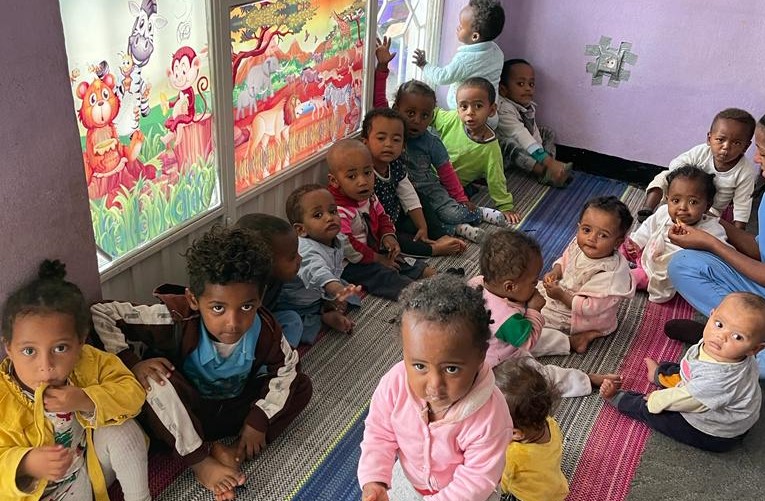Story
Becoming pregnant out of wedlock, even if through no choice of their own, is shameful in many parts of Ethiopia. Many girls and young women who find themselves pregnant, no matter how, are forced to leave their family homes to raise their babies on the streets, or worse feel forced to abandon them. Meseret for Women supports single mothers to stay with their babies, gain skills and build self-esteem and not feel forced into putting them up for adoption or abandoning them.
A sanctuary for vulnerable mothers and babies
We run Meseret House, a sanctuary in Addis Ababa which rehabilitates and provides a loving, nourishing space for vulnerable single mothers, to recover from the trauma of abandonment, sexual assault and birth, bond with their baby, learn, develop skills and build a future for themselves. We offer practical skills training such as basket weaving and education, and support women to find meaningful and reliable employment.
Eight women in the most desperate of situations are referred to us every six months by the Ethiopian Government. Initially Meseret House allows these women and their babies time to recover and to bond after birth, which can often be a traumatic experience for both.
Once they are settled, we work intensively with each mother to create a personal development plan unique to them, that harnesses their natural skills and enables them to build resilience to help them live a life free of abuse or violence and with choice and control of their future. This might include life skill training, skills training and finding employment. After their 6 months stay women are provided with seed money to pay to rent a room for two months. Women join an established saving and credit cooperative and have a share bought for them in this cooperative. Saving with the cooperative allows them to borrow, at low-interest rates, when in need or for further investment in their own small businesses.
Each year we support 16 women and 16 babies/children, at our Rehabilitation Centre. Each of these women supports up to 5 further people including their own other children and other family members including grandparents and siblings.

Genet and Aklilu's Story
Genet suffered emotional abuse at the hands of her family who kicked her out of the house for becoming pregnant by someone they did not approve of. She was forced to beg on the street with her son Aklilu who was only 1 year old at the time. She came to the Meseret House, and during her six months stay received training in life skills, entrepreneurship and basic business skills. Genet also benefited from Meseret for Women's cooperative scheme.
Genet is currently employed in a government-owned cleaning service, and also works as a secretary to a credit association. Genet has become one of Meseret for Women's strongest ambassadors in her community, helping to spread the word and empower others to pursue their own destiny and choices. She epitomises the role as leader and role model for other women in similar circumstances. Aklilu, her son, continues to use the Meseret Day Care allowing Genet to continue to work and earn money, in the confidence that her son will be fed and cared for in a safe and loving space.
Since Meseret for Women commenced operations in November 2017, there have been 54 women and 63 children that have benefited from rehabilitation support. We have so far supported 35 women like Genet to access employment and have supported the reuniting of 7 girls and young women with their families, but we need to support so many more.
Food costs alone are rising rapidly in Addis and we have a waiting list of at least 16 vulnerable mothers.
Combined with an incredibly challenging fundraising landscape for smaller charities, in particular those working internationally, with COVID19 response funds focusing more and more on causes closer to home within the UK.
Our fundraising challenges were compounded by the sudden death of our Co-Founder Tom Duke, who supported us to fund almost all of our annual budget. We have fundraised extensively but the unprecedented demand for our support in Ethiopia, combined with an extremely challenging set of personal circumstances and near to no fundraising capacity leaves us currently at risk of closure.
If the worst were to happen and we could not raise the shortfall we need, we would risk these women and babies being forced back onto the streets with their children. We urgently need your help to prevent this from happening.
 Campaign by
Campaign by 